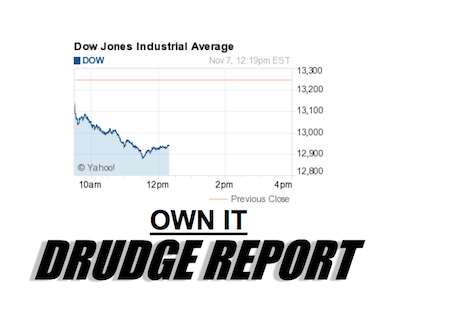The stock market dive the day after President Obama was re-elected, dropping 320 points, or 2.4 percent.
The Drudge Report, the testing ground/early-warning system for right-wing memes, put the Dow as its top post-election story, telling Obama to “own it”:

Fair enough, but as I wrote on Twitter the other day, if Obama has to own that one-day 2.4 percent decline, he gets to own the 61 percent increase since his inauguration day (98 percent since the Dow bottomed out in March 2009).
But Drudge was hardly the only one to flub the post-election markets reporting.
USA Today wrote that “Investor reaction is decidedly negative over the defeat of the more business-friendly Mitt Romney” and that “The worst fall was after Obama’s first White House win in November 2008, when stocks ended more than 5% lower.”
Well, yes, but let’s have a little bit of context, particularly since one-third of the country thinks we have a commie in the White House. That November 2008 plunge was in the middle of an ongoing market crash, and USA Today doesn’t mention that the stock market has soared in Obama’s first term, which you can be assured means that the Obama administration—with its Geithners and its Summerses and its JPMorgan, Citigroup, and Goldman Sachs alums—is hardly unfriendly to business.
There’s more iffy markets reporting here. USA Today tells us 13,000 is “psychologically significant.” Sorry, but it’s really not, particularly when the markets are mostly driven these days by computers that don’t have psyches (at least not yet).
I noticed several other examples of poor coverage. Here’s Breitbart‘s headline, which said “Forward Downward: Stocks Crash After Obama Win” and was followed by dim-bulb analysis:
Renewed job creation, strong retail performance in the fourth quarter, and a political solution to the long-term debt problems of the U.S. government would all combine to create a sunnier outlook. But for the moment, those goals are uncertain, and the economic outlook on the morning after Obama’s triumph looks dim for now.
No, a one-day move in the stock market doesn’t imply the economic outlook has suddenly darkened.
The Boston Herald wrote this:
Wall Street cast its vote yesterday as investors signaled they believe President Obama will see his victory as a mandate to turn the screws on big business and allow the Bush tax cuts to expire for “millionaires and billionaires.”
Here’s the Los Angeles Times:
Investors don’t seem too happy with President Obama’s reelection, at least initially, as stocks dropped sharply in early trading on Wall Street.
And Fox Business’s Stuart Varney, daydreaming about going Galt, mused that, “With Obama’s victory, the takers have taken over. The makers are clearly in the minority… so stocks down, bonds up and this is largely a reaction to the Obama victory.” Oh, and bonds? The ten-year Treasury yield is at 1.625 percent, not far from an all-time low.
The problem is that none of these stories mentioned that the stock market has soared over the last four years under Obama. All of them either state outright or imply that investors think Romney would have been better for investors or for the economy. And Romney surely would have favored investors’ short-term interests. Part of the selloff, for instance, may be short-term pressure from investors unloading in-the-green investments before capital gains rates are slated to rise at the first of the year (there was also bad news out of Europe).
But the truth is—and this is something you rarely see reported—stock markets and the economy tend to do far better under Democratic presidents than Republican ones. For that we go to, of all places, Fox Business in this September piece:
According to McGraw-Hill’s S&P Capital IQ, the S&P 500 has rallied an average of 12.1% per year since 1901 when Democrats occupy the White House, compared with just 5.1% for the GOP.
Likewise, gross domestic product has increased 4.2% each year since 1949 when Democrats run the executive branch, versus 2.6% under Republicans.
And even if you just look at the last fifty years, it still holds. See this Bloomberg story.
Much of this is a correlation/causation thing (and it doesn’t take into account the makeup of the Congress). But so is almost all markets reporting of the kind we saw on Wednesday.
If you must do the kind of daily market-reports stories that the business press thinks it has to (and read Felix Salmon on why it shouldn’t), then at least give us some context beyond what you think happened in six and a half hours of trading.
Ryan Chittum is a former Wall Street Journal reporter, and deputy editor of The Audit, CJR’s business section. If you see notable business journalism, give him a heads-up at rc2538@columbia.edu. Follow him on Twitter at @ryanchittum.
